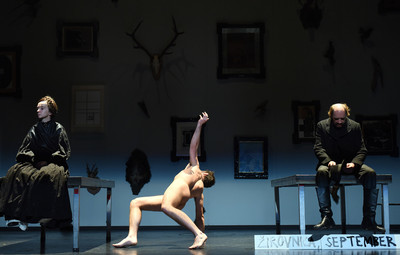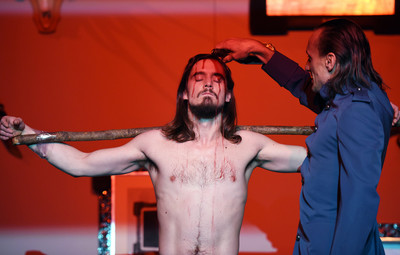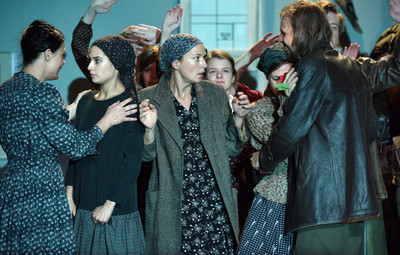Ivo Svetina
In the Name of the Mother
Slovenian National Theatre (SNT) Drama Ljubljana
Crew
Director: Ivica Buljan
Umetniški svetovalec: Robert Waltl
Dramaturg: Mojca Kranjc
Author of the exhibition Kapital 2018: Irwin
Costume designer: Ana Savić Gecan
Composer: Mitja Vrhovnik Smrekar
Lighting and video designer: sonda57, Toni Soprano Meneglejte
Language consultant: Arko
Assistant to director: Luka Marcen
Assistant to costume designer: Sara Smrajc Žnidarčič
Cast
Anton Santini: Janez Škof
Katarina, his second wife: Veronika Drolc
Anton Santini jr., their son: Gal Oblak
Ivan Santini, Anton's brother, canon: Saša Tabaković
Vida Vovk, teacher in Zasip and poet: Nina Valič
Ivo Santini, Anton and Katarina's son: Klemen Janežič
Marija, born Entor, his wife: Pia Zemljič
Vladimir, ilegal name Ivo, their son: Aljaž Jovanović
Armela, their daughter: Maša Derganc
Bogdan, their son: Andraž Harauer
Vida, their daughter: Sabina Kogovšek
Leon Okrožnik, Armela's fiancé / future husband: Nik Škrlec
Egidij Matič, Vida's fiancé / future husband: Martin Mlakar
Tatjana, Bogdan Santini and Meta Štraus's daughter: Lana Bučevec
Tili: Nika Vidic
Mira, ilegal name Vlasta: Barbara Cerar
Alojz, ilegal name Štefan, her husband: Žan Brelih Hatunić
Nasta, their daughter: Julija Klavžar
Vlasta, Mira (Vlasta) and Vladimir's (Iva) daughter: Lara Fortuna
Ivo, Mira (Vlasta) and Vladimir's (Iva) son: Luka Bokšan
Nastja, Armela and Leon's daughter: Saša Pavlin Stošić
Poet; Hauptman Sterngrüber; Interrogator: Marko Mandić
About the performance
The voyage of the family S. through the 20th century is not a Carniolan version of One Hundred Years of Solitude, but a semi-documentary tale of a family originating in a village at the foot of Stol in the north of Slovenia. The great Slovenian Romantic poet Prešeren’s mother Mina was related to the family too. It is a story of a family that refused to remain a passive observer of history, but tried to become its co-creator, even though this carried along a dark shadow of doubt in life and made it look for redemption underneath an empty sky, in death.
Be it a young man’s suicide because of unrequited love towards a young teacher Vida, a suicide brought upon by a loss of woods in a game of cards, or a deliberate sacrifice for a better tomorrow, for a revolution that had not yet gobbled up its own children but handed over the revolutionaries’ children to be looked after substitute mothers during the national liberation war. The children were called the little illegals. Or a little girl who spent the war with her mother in a
concentration camp. A chorus of female characters, including the poet Vida Jerajeva, the daughters of revolutionaries, national heroes, who grew up in the late 1950s and early 1960s, grounds the male characters who prefer to live in the zone of ideas rather than making them come true in the real world,. In the same way as giving birth is such a joy for a woman, death is an unfathomable force, a passion for life, for struggle, for victory.
Ivo Svetina



